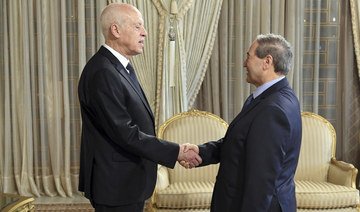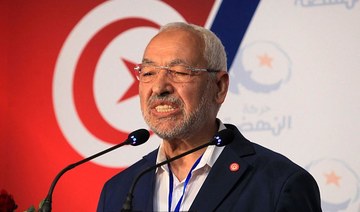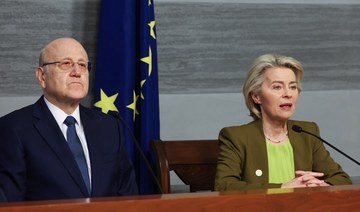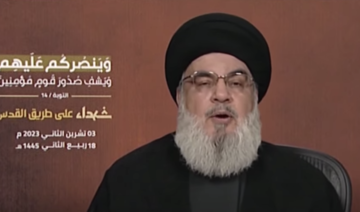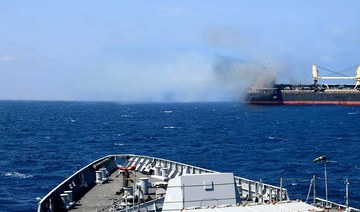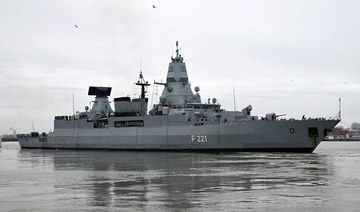TUNIS, Tunisia: It’s a feeble drip, drip, drip from the taps every night in Tunisia for six months. Spigots are cut off for seven hours from 9 p.m. to 4 a.m. in a state-ordered water rationing in most regions across the country, including Tunis, the capital city.
Tunisians are on the front lines of a battle against an increasingly severe drought, now in its fifth year in the north African country, with the government issuing a sudden order to its population to ration their water usage from April to September — or risk fines or jail.
Households now need a supply of bottled water to wash, use toilets and prepare meals during late night hours. Authorities have also forbidden the use of potable water for irrigation of farmlands, watering green areas in cities and for cleaning streets and cars.
Water levels at almost all of Tunisia’s 30-plus dams have fallen drastically, some as low as 17 percent of their storage capacity.
The Sidi Salem dam in northwest Tunisia provides tap water to Tunis and along the Tunisian Sahel, including cities like Sfax, as well as water for irrigation around Tunis. But water stored there is at its lowest level since its construction in 1981, the newspaper La Presse reported, quoting Faycel Khemiri, the No. 2 official for dams and hydraulic works at the Agricultural Ministry.
Human-caused climate change, which is burning up the planet, has made droughts worldwide more likely, with higher-than-average temperatures drying up land and altering rainfall patterns. Drought has also plagued Tunisia in the past, historically devastating farmland and olive groves.
“Currently, we have reached the red line, the danger line in terms of water scarcity,” said Aymen Hmem, a member of an environmental group in the northeastern coastal town of Menzel Temime, which has a large dam on its outskirts.
There’s also concern over a potentially scorching summer in Tunisia — where temperatures can top 40 degrees Celsius (104 degrees Fahrenheit) — ramping up water demand and causing eventual protests over the cuts.
The country is already in the midst of an economic crisis. Talks with the International Monetary Fund for a $1.9 billion loan agreement to help finance the state stalled late last year amid Tunisia’s political tensions.
Tunisia is experiencing its worst crisis in a generation as inflation hovers around 11 percent and food supplies are increasingly scarce, according to the Organization for Economic Cooperation and Development.
Then came the water rationing order, a baptism by fire for many citizens, which coincided with the Muslim holy month of Ramadan where people gather to break their fasts with large feasts and gatherings and water use is normally intense.
Ramadan is nearly over, but summer and the start of tourist season will turn up the heat. Tourism is a major source of income for Tunisia, with the country of about 12 million people boasting around 850 hotels.
To underline the seriousness of the water problem, the agriculture ministry has resorted to a punitive approach: Those who use tap water to wash their cars or other banned uses risk fines of 60 to 1,000 dinars ($20 to $320) or even prison sentences ranging from six days to nine months in the most serious cases. They can also be struck from the distribution list of the country’s state-owned water company, Sonede, cutting off their supply.
Radhia Essamin, from the Tunisian Water Observatory, said the decision to cut the water supply was not surprising, given the country’s worrisome water shortage. But it should have been handled differently, she said, notably with a campaign so people could prepare themselves ahead of time.
“That is why we consider these measures incomplete. Before taking any measures, the citizen must be ... made aware of the importance of water rationing,” she said. “A booklet should have been published (explaining) water consumption, storage, timing and the quantity allowed to be stored.”
Abdelkader Hmissi, who lives outside Tunis, said that although many people were caught by surprise by both the extent of the drought and measures to counter its effects, he was not.
Hmissi said he built a water tank two years ago in anticipation of a prolonged drought, and now shares his supply.
“We found the solution in this tank. And my brothers and neighbors use it, too,” Hmissi said.
In grim drought, Tunisians ration water in state-ordered ban
https://arab.news/g6vmg
In grim drought, Tunisians ration water in state-ordered ban
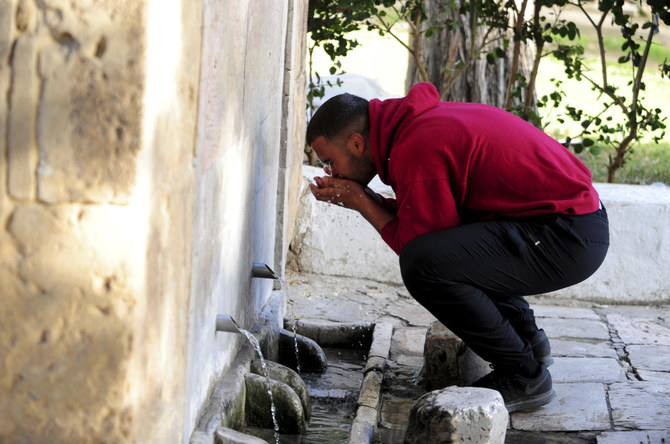
- Tunisians are on the front lines of a battle against an increasingly severe drought, now in its fifth year
- Water levels at almost all of Tunisia’s 30-plus dams have fallen drastically, some as low as 17 percent of their storage capacity
First international UN staff member killed in Gaza attack

UN chief Antonio Guterres “was deeply saddened to learn of the death of a United Nations Department of Safety and Security (DSS) staff member and injury to another DSS staffer when their UN vehicle was struck as they traveled to the European Hospital in Rafah,” said his deputy spokesperson Farhan Haq.
It was “the first international casualty” for the UN since the start of the Israeli offensive in Gaza in retaliation for the Hamas attack of October 7, Haq said, recalling that some 190 Palestinian UN employees have been killed, mainly staff of the UN Palestinian Refugee Agency (UNRWA).
“The Secretary-General condemns all attacks on UN personnel and calls for a full investigation,” Haq said.
The spokesman did not immediately release the nationality of the person killed.
“I don’t have the full details of whether this was part of a large convoy or not, I believe it was in a convoy that was moving, and this was the DSS vehicle that was hit,” he said.
The DSS oversees the security of UN agencies and programs in more than 130 countries around the world.
Hezbollah chief urges Beirut to allow Syrian migrant boats to leave for Europe

- Hassan Nasrallah called for ‘a national decision that says: we have opened the sea... whoever wants to leave for Europe, for Cyprus, the sea is in front of you. Take a boat and board it’
- Cyprus, the EU’s easternmost member, is less than 200 kilometers (125 miles) from Lebanon and Syria, and wants to curb migrant boat departures from Lebanon toward its shores
BEIRUT: Hezbollah chief Hassan Nasrallah on Monday urged Lebanese authorities to open the seas for migrant boats to reach Europe, amid soaring anti-Syrian sentiment and accusations the West is seeking to keep refugees in Lebanon.
His remarks came in an apparent bid to pressure the European Union after it announced earlier this month $1 billion in aid to Lebanon to help tackle irregular migration.
Many in crisis-hit Lebanon have criticized the aid package as focused on preventing refugees from leaving the country, amid mounting calls for them to return home.
In a televised address, Nasrallah called for “a national decision that says: we have opened the sea... whoever wants to leave for Europe, for Cyprus, the sea is in front of you. Take a boat and board it.”
But “we do not propose forcing displaced Syrians to board boats and leave for Cyprus and Europe,” he added in the speech, broadcast on the group’s Al-Manar television channel.
Cyprus, the EU’s easternmost member, is less than 200 kilometers (125 miles) from Lebanon and Syria, and wants to curb migrant boat departures from Lebanon toward its shores.
Currently refugees “are prohibited (from leaving), and so they turn to smuggling and to rubber boats, and there are drownings in the sea, because the Lebanese army is implementing a political decision to stop them from migrating,” Nasrallah added.
Lebanon says it currently hosts around two million people from neighboring Syria — the world’s highest number of refugees per capita — with almost 785,000 registered with the United Nations.
Lebanon needs to tell the West that “we all have to coordinate with the Syrian government to return the displaced to Syria and to present them with aid there,” Nasrallah said.
He also urged Lebanon’s parliament to press the EU and Washington to lift sanctions on Syria that Damascus says are blocking aid and reconstruction efforts, adding: “If sanctions on Syria aren’t lifted, there will be no return” of refugees.
Nasrallah’s remarks came a day before Lebanon is expected to resume “voluntary returns” of Syrians, with dozens of families set to pass through two land border crossings in the country’s east, a year and a half after such returns were paused.
Lebanon’s economy collapsed in late 2019, turning it into a launchpad for migrants, with Lebanese joining Syrians and Palestinian refugees making perilous Europe-bound voyages.
Some Lebanese politicians have blamed Syrians for their country’s worsening troubles, and pressure often mounts ahead of an annual conference on Syria in Brussels, with ministers meeting this year on May 27.
Rights groups including Amnesty International and Human Rights Watch have warned that Syria is not safe for returns.
No pollution from ship hit by Houthis in Red Sea, Yemeni minister says

- A Yemeni government official told Arab News on Monday that the UN team, made up of experts from various UN bodies, informed the Aden-based Yemeni government that rescuing the ship was “impossible”
AL-MUKALLA: Yemen’s Water and Environment Minister Tawfeeq Al-Sharjabi said his ministry found no signs of pollution from a ship filled with fertilizer and gasoline that sunk in the Red Sea.
“No leakage has come from the vessel yet, although it remains an environmental concern at all times,” the Yemeni minister told Arab News. He urged the world to assist the war-torn country in recovering the vessel.
In February, Yemen’s Houthi militia fired missiles at the Belize-flagged and Lebanese-operated MV Rubymar, which was carrying 22,000 tonnes of ammonium phosphate-sulfate NPS fertilizer and more than 200 tonnes of fuel while sailing in the Red Sea, severely damaging it and causing a large oil slick in the sea.
The ship eventually sank, prompting warnings from authorities as well as local and international environmentalists that the ship’s cargo could seep into the water or explode.
The Houthi attack on the ship was part of a larger operation targeting naval and commercial ships in the Red Sea, Bab Al-Mandab Strait and the Gulf of Aden, which the Yemeni militia claims is in support of the Palestinians.
At the same time, a UN team that examined the sinking ship in March concluded that it could not be recovered owing to the expense and a lack of equipment, suggesting that the ship be left to sink.
A Yemeni government official told Arab News on Monday that the UN team, made up of experts from various UN bodies, informed the Aden-based Yemeni government that rescuing the ship was “impossible” and advised the Yemeni government to continue monitoring the ship via a remotely operated vehicle, as well as the country’s coastline for signs of pollution.
“The UN team said that they hoped the ship would sink to the bottom of the sea and that the leaking would occur in stages, allowing the fertilizer to disintegrate and causing no harm. Their primary fear is that the leak may occur in a single day,” a Yemeni government official said, adding that recovering the ship would be more difficult the deeper it sank.
As for the ship’s fuel load, the UN team believed that it would not do much harm if it spilled into the water gradually, but they did not rule out the option of sucking it from the ship via pipes, the Yemeni official said.
Meanwhile, the US Central Command said that its forces on Sunday shot down a drone over the Gulf of Aden that was launched by the Houthis from regions under their control. The Houthis have not claimed credit for the new wave of drones and ballistic missiles intercepted by the US-led maritime coalition in the Red Sea since Thursday.
This comes as the EU mission in the Red Sea, known as Eunavfor Aspides, said on Monday that a Dutch warship, HNLMS Karel Doorman, has joined its fleet of ships in the Red Sea to safeguard commercial ships against Houthi attacks.
“We thank the Netherlands for their swift and precious contribution. EUNAVFOR ASPIDES is getting stronger,” the EU mission said in a post on X.
Turkiye’s Erdogan hosts Greek PM, sees ‘no unsolvable problems’ in bilateral ties

- “Despite disagreements, we focus on a positive agenda by keeping our dialogue channels open,” Erdogan said
- “We showed today that alongside our proven disagreements, we can chart a parallel page of agreements,” Mitsotakis said
ANKARA/ATHENS: Turkish President Tayyip Erdogan told Greek Prime Minister Kyriakos Mitsotakis during talks in Ankara on Monday that there were “no unsolvable problems” between their countries.
Turkiye and Greece, NATO allies and historic foes, have long been at odds over issues including maritime boundaries, energy resources in the eastern Mediterranean, flights over the Aegean Sea, and ethnically split Cyprus.
After years of tensions that brought the two to the brink of conflict, they have started taking high-profile steps to improve ties, especially since both leaders were re-elected last year.
“Despite disagreements, we focus on a positive agenda by keeping our dialogue channels open,” Erdogan told a joint press conference with Mitsotakis.
Mitsotakis said the leaders’ frequent meetings in recent months had “proved that we neighbors can establish an approach of mutual understanding, not as an exception but as a productive normality.”
“We showed today that alongside our proven disagreements, we can chart a parallel page of agreements,” he added.
Erdogan visited Athens last December and the two countries signed the “Declaration of Athens” aimed at setting the base for a roadmap to rebooting relations.
They agreed to boost trade, keep communication channels open, carry out military confidence-building measures to reduce tensions, and work on problems that have kept them apart.
The two leaders disagreed over how to classify the Palestinian militant group Hamas. Erdogan reiterated his view that it is a “resistance movement” and said he was saddened by the Greek view — shared by many other Western countries — that it is a terrorist organization.
“Let’s agree to disagree,” Mitsotakis replied.
“Unprecedented heights”
On Sunday, Mitsotakis told Turkish daily Milliyet that his visit to Ankara — the first in five years — was an opportunity to evaluate progress and to reiterate Athens’ commitment to improving ties.
Erdogan, speaking to Greek daily Kathimerini on Sunday, said the main goal was to “raise the level of our bilateral relations to unprecedented heights,” adding the neighbors had many issues they could agree on while seeking solutions to their problems.
However, the allies remain at loggerheads over several issues including maritime jurisdiction.
Greece’s plan to build a marine park in the Aegean, which it says is for environmental purposes, has upset Turkiye, while Athens was annoyed by Turkiye’s decision to turn the ancient Chora church, previously a museum for decades, into a mosque.
Five Israeli soldiers injured in intense clashes along Lebanese border

- Drones used in attack were made in Lebanon, Hezbollah says
- Southern front ‘no less important than what is happening in the Gaza Strip,’ lawmaker says
BEIRUT: Lebanon’s Hezbollah on Monday claimed responsibility for a strike that Israel said wounded five soldiers in the country’s north, the latest casualties in more than seven months of cross-border clashes.
The group said it carried out “an aerial attack with a swarm of suicide drones targeting Israeli soldiers’ sleeping quarters in Beit Hillel.”
The attack succeeded in “killing and injuring Israeli commanders and soldiers … (at a) newly established site for the 403rd Reserve Artillery Battalion of the 91st Division south of Beit Hillel,” it said.
The Israeli Ziv Medical Center reported “the arrival of four injured soldiers due to a fusillade near the Yiftah settlement in northern Israel on the Lebanese border.”
The Israeli army later said that five soldiers had been injured.
Meanwhile, Israel conducted a drone strike on the Lebanese town of Chihine, with no casualties reported.
At the time of the raid, residents were fleeing the area after coordinating with UNIFIL forces operating in the region and the Lebanese Army.
The Israeli army also fired artillery and machine guns at targets on the outskirts of Mays Al-Jabal.
The resumption in hostilities came after a relatively calm Sunday and ahead of a speech by Hezbollah’s secretary-general on Monday evening.
The group also said it “targeted a group of Israeli soldiers in the Israeli site of Birkat Risha.”
Israeli media reported that missiles were launched at Pranit Barracks in Western Galilee in Lebanon.
Hezbollah said it destroyed a Merkava tank with a guided missile and caused casualties “after closely observing the movements of the enemy at the Yiftah barracks.”
It also targeted Israeli soldiers near the Al-Jardah site.
The Israeli army said a drone fired from Lebanon fell in the Zarit area but no one was hurt.
Lebanese security reports said: “Hezbollah introduced new weapons into its military operations. These included heavy missiles and a new drone with optical or thermal guidance to target the Israeli Iron Dome.”
Hezbollah lawmaker Hassan Ezz El-Din said that the support front that Hezbollah had opened in southern Lebanon to help the Gazans was “no less important than what is happening in the Gaza Strip.”
The group “has so far only used traditional weapons developed by brothers working in the national industry. So, these drones are a Lebanese national industry,” he said.
After discussions on a ceasefire settlement on the southern front ended, Lebanese Army Commander Gen. Joseph Aoun met Qatar’s Prime Minister and Foreign Minister Sheikh Mohammed bin Abdulrahman bin Jassim Al-Thani in Qatar.
The Foreign Ministry quoted the prime minister as saying that Qatar would “continue to provide support to the military institution so that it can continue its essential role in preserving Lebanon’s security and stability.”
The ceasefire efforts focus on the implementation of UN Resolution 1701 through the reinforcement of the Lebanese army in the border region and the withdrawal of Hezbollah from it.
Villages and towns in southern Lebanon have been deserted for more than seven months after residents fled the Israeli shelling of their homes. Those that remain have to race to bury their lost loved ones between attacks.
Fadi Hounaikah and his family were killed in an Israeli raid as they examined the remains of the supermarket they once ran and which had been damaged in a previous strike.
A local security source said Hezbollah had advised local people attending funerals not to check on their damaged properties during processions because of the dangers involved.
Residents should instead “accompany the funeral procession and take maximum precautions to ensure their safety,” the group said.
Also, after infrastructure maintenance teams were targeted by attacks, UNIFIL mediated with the Israeli side to allow them set times to carry out essential repairs to water, electricity and telecommunications systems.
However, a technician and a paramedic were killed last week when a maintenance team for a mobile service provider was targeted by an Israeli raid, despite being accompanied by the Lebanese Army.



